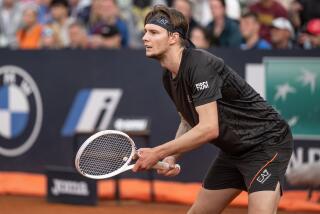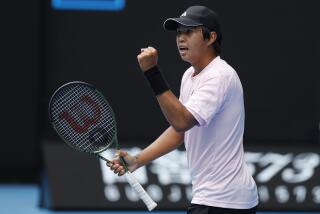Turkich Appreciates American Life, Especially on Court
- Share via
NEWPORT BEACH — Corona del Mar tennis Coach Tim Mang knew he was getting a pretty good player in Boris Turkich, exchange student, but he had no idea a role model and a heavy dose of reality was part of the package.
Turkich, 16, a junior from Zagreb, Croatia, probably doesn’t know it, but in two months he has given his new teammates, and Mang, lessons in tennis, commitment and life.
“He’s very competitive,” Mang said. “He wants to get straight A’s, he wants to win every match and he wants to learn everything. He picks things up very quickly. It’s incredible how adept he is.”
But as incredible as Turkich has been on the court--33-1 in matches--Mang said he might be more incredible off the court.
“He’s always telling me, ‘These kids don’t know how lucky they are. I hope these kids let their parents know how thankful they are to be living where they’re living and doing what they’re doing.’ You don’t hear that kind of talk much around here.’ ”
But in Newport Beach you don’t normally hear from someone whose country has been torn apart by a civil war. Turkich has seen families displaced, bombed-out buildings and has been in his basement wondering if the next bombs were meant for him and his family.
Maybe that’s why tennis is so important when he’s on the court, and so trivial when he’s off the court.
“A lot of kids here don’t care whether they win or lose, they just play,” said Turkich, who was ranked sixth in Croatia in his under-18 age group. “We play for 3 1/2 hours on the clay courts in Croatia, and it really matters whether you win or lose.”
Turkich has noticed other things about Americans.
“People don’t care much for each other,” he said. “Friendship is not so deep. A lot of kids in high school don’t appreciate what they have here. I guess I could say they’re spoiled.”
Phil Dent, a former professional player who coaches Turkich, said he could immediately see that Turkich was not the typical Southern Californian tennis player.
“He’s a tough player,” said Dent, whose son, Taylor, plays on Corona del Mar’s team and often practices with Turkich. “He’s a competitor. He’s a little tougher mentally than some of our kids. He appreciates things a little more than some of our kids might.
“He lives tennis. That’s going to make him a little hungrier. A blister on his toe or a sore back is not really going to bother him.”
So far, all that has bothered Turkich is the hardcourt surface he plays on. The transition from clay to cement has been slow for Turkich, who had only played on carpet before arriving in Southern California.
“A lot of shots he hits from his heels,” Mang said. “And he doesn’t come to the net much. The surface frustrates him. Sometimes he’ll say, “Coach, I can play much better than this.’ ”
Turkich said he’s lucky he hasn’t been hurt trying to slide on a surface that doesn’t have much give to it.
“On clay you slide into your shot, but a couple times I’ve done that here and I’ve jammed my toe or come up short of the ball,” he said.
Now that he’s starting to adjust to the faster surface and pace of American tennis, Turkich said he prefers it to European tennis. Turkich, whose best weapon is his backhand, has already defeated two of the top juniors in Southern California, Nick Varvais of Simi Valley and Jose Lieberman of Los Angeles.
Today, Turkich will face Newport Harbor’s Geoff Abrams, the quintessential American player. Abrams is a 6-foot-5 serve and volleyer and is one of the top 18-year-olds in the world. Turkich said he is excited to play Abrams.
“Most of the good players play serve and volley here,” he said. “The points are a lot longer over there. Here, you have to be a lot more focused. You can’t afford any unforced errors. But I like it. Hitting 30 balls from the baseline--that’s boring. I usually wanted to finish the point off earlier in Croatia, but a lot of clay courters just want to get it over the net.
“Here, one good shot might be enough. Over there, one good shot only sets up another good shot. It might take 10 good shots to win a point because the ball moves so slowly. You have to work harder for everything.”
Turkich’s U.S. visa expires in June, but he’s hoping to come back and rejoin his older brother, who attends Orange Coast College. His goal is to return to the United States in a year with a college tennis scholarship.
Even if he doesn’t return, it is doubtful Mang and his players will soon forget Turkich.
More to Read
Go beyond the scoreboard
Get the latest on L.A.'s teams in the daily Sports Report newsletter.
You may occasionally receive promotional content from the Los Angeles Times.










